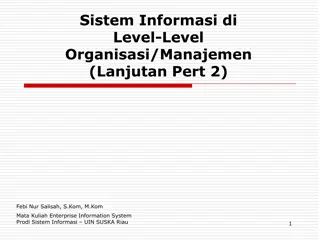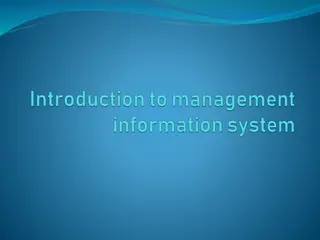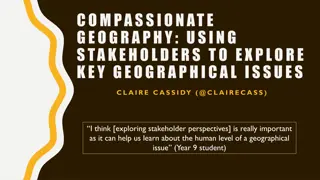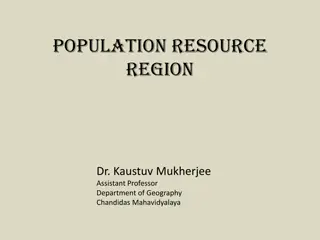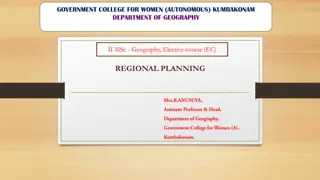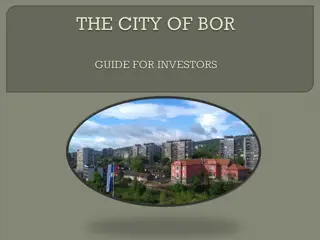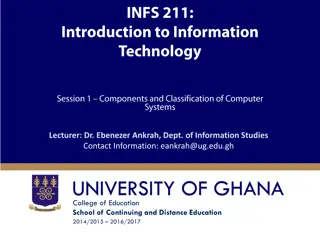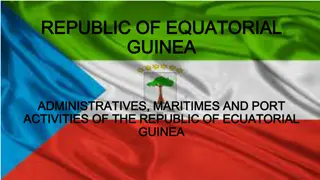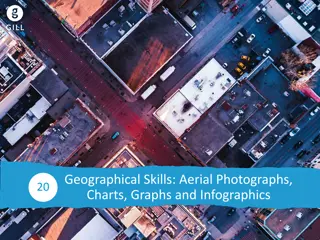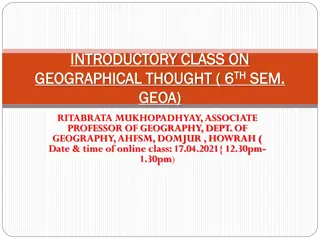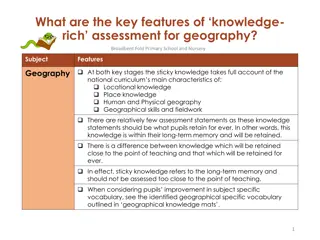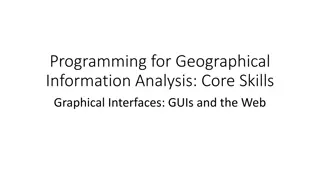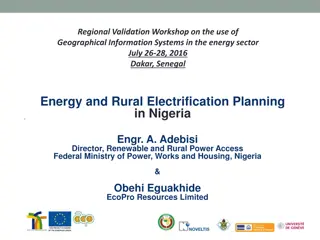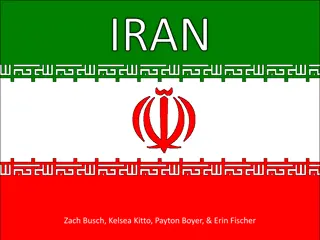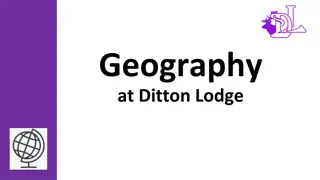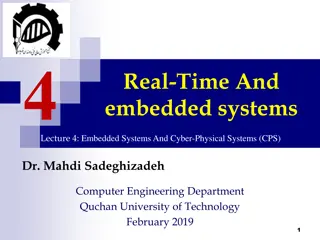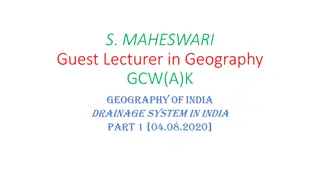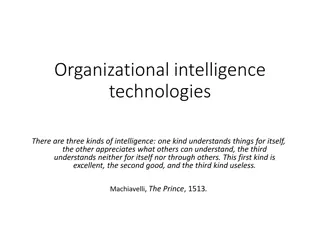Supporting Students through the Transition: Key Challenges and Strategies
Explore the transition from GCSE to A-Level through a geographical lens at the Geographical Association Conference 2021. Andy Barker and Dr. Richard Waller discuss key challenges like study skills, geographical thinking, and learning culture. Discover strategies such as promoting wider reading, news
1 views • 32 slides
Overview of Distributed Systems: Characteristics, Classification, Computation, Communication, and Fault Models
Characterizing Distributed Systems: Multiple autonomous computers with CPUs, memory, storage, and I/O paths, interconnected geographically, shared state, global invariants. Classifying Distributed Systems: Based on synchrony, communication medium, fault models like crash and Byzantine failures. Comp
10 views • 126 slides
Enhancing Geography Education Through Reading: A Teacher's Perspective at #GAConf21
Simran Jouhal, a Senior Teacher at The Archer Academy in North London, shares insights on integrating reading into the geography curriculum. She discusses the importance of reading for geographical vocabulary, case study knowledge, fostering a love for geography, and developing critical thinking ski
5 views • 20 slides
Information Systems in Organizational Management
Management in organizations is divided into three levels: operational, tactical, and strategic. Each level requires different information systems to support various activities. Operational systems focus on routine transactions and control processes, while middle-level systems aid in semi-structured
10 views • 39 slides
Management Information Systems (MIS)
Management Information Systems (MIS) are vital for collecting, processing, and analyzing data in business activities. They assist decision makers, facilitate communication, and maintain records. Components include people, data, business procedures, hardware, and software. Various types of informatio
3 views • 11 slides
Geographical Issues Through Stakeholder Perspectives
Exploring stakeholder perspectives in geography education helps students understand human aspects of geographical issues. Stakeholders enable a deeper insight into the impacts of a situation on individuals and communities. This approach fosters compassion and a broader understanding of complex geogr
1 views • 17 slides
Geographical Indications of Dairy Products in India
India has a rich heritage of traditional dairy products recognized under Geographical Indications (GI) Act of 1999. The GI registered dairy goods include Dharwad Pedha from Karnataka, Banglar Rasogolla from West Bengal, Odisha Rasogolla from Odisha, and Srivilliputtur Palkova from Tamil Nadu. Each p
0 views • 19 slides
Evolution of Data Processing Systems in Geographic Information Science
Data processing systems in Geographic Information Science have evolved from manual, analogue methods to advanced software and hardware components. The incorporation of Geographic Information Systems (GIS) has revolutionized the handling and analysis of geo-referenced data, making tasks like data cap
3 views • 20 slides
Different Types of Recommender Systems
Recommender systems play a crucial role in providing personalized recommendations to users. This article delves into various types of recommender systems including Collaborative Filtering, Content-Based, Knowledge-Based, and Group Recommender Systems. Collaborative Filtering involves making predicti
1 views • 7 slides
Population-Resource-Region Relationship: A Geographical Perspective
Explore the intricate relationship between population, resources, and regions through a geographical lens. Delve into classifications based on population, resources, and technology, with examples from different countries and regions. Discover the concepts of optimum population, over-population, and
2 views • 11 slides
Introduction to Embedded Systems Design
Embedded Systems Design, Chapter 1 provides an insightful overview of embedded systems, distinguishing them from general-purpose computers. The chapter delves into the characteristics of embedded systems, their design considerations, and the various types of embedded computers such as general-purpos
2 views • 7 slides
Geographical Space in Geography Studies
Geographical space in geography encompasses natural and social elements, defining locations, and interactions essential for comprehending the world. Space and place influence various aspects such as economics, health, and climate. Geographers explore spatial distribution, processes, and human-enviro
0 views • 20 slides
The City of Bor: A Geographical Overview
Situated in the east of the Republic of Serbia, the City of Bor is surrounded by mountains and rich in natural resources like copper and gold. Its diverse landscape, from limestone ridges to karst surfaces, makes it a unique geographical unit. The city has a population of 48,615 and encompasses seve
0 views • 19 slides
The Importance of Fieldwork in Geography
Fieldwork in geography involves observing and collecting data about people, cultures, and natural environments in real-world settings. It allows for practical experiences that reinforce classroom learning, enhance knowledge, skills, and understanding, and encourage geographical inquiry and higher-or
0 views • 8 slides
Legal Protection of Geographical Indications of Goods in Indian Legislation
Geographical indications are crucial for recognizing products' origins and preserving their unique qualities. This article explores the legal framework surrounding geographical indications in India, highlighting the Geographical Indications of Goods Act, 1999. It discusses the distinction between in
1 views • 10 slides
Introduction to Computer Systems: Components, Types, and Functions
This session conducted by Dr. Ebenezer Ankrah covers the essential aspects of computer systems, including hardware components, types of computer systems, and information systems. Students will gain an understanding of the fundamental principles and characteristics of computer systems, enabling them
0 views • 41 slides
Maritime and Geographical Overview of Equatorial Guinea
Equatorial Guinea, a country in central Africa, boasts a significant maritime presence and strategic geographical location in the Gulf of Guinea. With a population of over 1.2 million, it shares borders with Cameroon and Gabon while having maritime boundaries extending 320 nautical miles. The countr
0 views • 15 slides
Geographical Skills: Aerial Photographs, Charts, Graphs and Infographics
Aerial photographs are key tools for interpreting land surfaces, with vertical and oblique types used for different perspectives. Locating places on photographs involves dividing them into sections and understanding directions. Sketching aerial photographs requires creating a frame and dividing sect
0 views • 30 slides
Cultural and Geographical Diversity of Africa's Ethnic Groups
In this social studies lesson for 7th grade students, the focus is on understanding the history, environmental issues, population distribution, and cultural characteristics of Africa. Students will explore different forms of citizen participation in government, analyze economic systems, and delve in
0 views • 4 slides
Canada and Nepal - A Cultural and Geographical Journey
Discover the beauty and richness of Canada and Nepal through images and information about their geography, leaders, and iconic landmarks. Learn about Canadian Parliament in Ottawa and get insights into Nepalese culture, myths, and legends. Dive into the geographical information of both countries to
0 views • 21 slides
Advanced Techniques in Relational Data Outlier Detection
This document delves into cutting-edge methods for outlier detection in relational data, focusing on profile-based and model-based approaches such as leveraging Bayesian networks, feature generation, and individual feature vector summarization. The examples provided showcase the application of these
1 views • 30 slides
The Geographical History of Shish Kebab: Tracing Its Cultural Landscape
Exploring the geographical concepts of region, diffusion, and cultural landscapes through the history of Turkish Shish Kebab. The presentation delves into the roots of the term, its significance in Turkish nomadic tribes, and diffusion across regions like the Middle East, Asia, and Europe.
0 views • 15 slides
The Seal of Origin Program in Chile
The Seal of Origin Program in Chile aims to add value to traditional products by emphasizing their specific geographical origins and unique qualities. It includes seals, geographical indications, appellations of origin, and certification marks to highlight the authenticity and standards of products.
0 views • 31 slides
Introduction to Geographical Thought: Key Concepts and Major Schools
Geographical thought explores the description and interpretation of Earth's phenomena, addressing fundamental questions of geography. It involves concepts such as Earth surface, spatial distribution, areal differentiation, and more. It also delves into the relations with other sciences and social sc
0 views • 21 slides
Information Systems in Organizations: Overview and Implementation
Information systems play a crucial role in organizations, encompassing transaction processing systems, functional area information systems, and enterprise resource planning systems. This content delves into the purpose of transaction processing systems, the support provided by information systems ac
2 views • 30 slides
The Enchanting Maldives: Geographical Wonders & Natural Beauty
Dive into the breathtaking world of the Maldives - an island paradise in the Indian Ocean known for its stunning natural landscapes, exquisite coral reefs, and tranquil atmosphere. Discover the geographical marvels of this island nation, including its unique atolls and pristine beaches. Uncover the
0 views • 20 slides
Key Features of Knowledge-Rich Assessment in Geography at Broadbent Fold Primary School
Broadbent Fold Primary School emphasizes sticky knowledge in geography assessment, focusing on locational knowledge, place knowledge, human and physical geography, and geographical skills. Assessment statements are designed to ensure long-term retention of key geographical concepts in students' memo
1 views • 8 slides
Introduction to Graphical User Interfaces (GUIs) in Python for Geographical Information Analysis
This content provides insights into creating Graphical User Interfaces (GUIs) in Python for Geographical Information Analysis. It covers the basics of GUI development using TkInter and event-based programming with a focus on user experience design and functionality. The lecture emphasizes the import
0 views • 45 slides
Energy Sector Workshop and Rural Electrification Planning in Nigeria
Regional Validation Workshop held in Dakar, Senegal focused on the use of Geographical Information Systems in the energy sector, particularly rural electrification planning in Nigeria. The workshop highlighted Nigeria's SE4All targets, including increasing electricity access, modern energy usage, an
1 views • 9 slides
Geographical Latent Variable Models for Microblog Retrieval
Addressing challenges in microblog retrieval such as vocabulary mismatch and multi-faceted relevance signals. Explore opportunities in leveraging lexical and non-lexical information, including geographical meta-data. Discuss prior work on utilizing timestamps and re-tweets, while also highlighting t
0 views • 19 slides
Insights into Greek Culture, Geography, and Population
Explore the rich cultural heritage, diverse geographical features, and unique demographic characteristics of Greece. Discover its geographical position, neighboring countries, physical borders, land composition, geographical regions, and population demographics including language and religion.
0 views • 8 slides
Historical and Contemporary Overview of Iran
Iran, once known as Persia, has a rich history of withstanding various invasions while maintaining its national identity and pride in culture. The nation has experienced political, geographical, economic, and social transformations over the centuries, shaping its current state. From geographical det
1 views • 26 slides
Correct Comma Usage in Geographical Names
Proper comma placement in geographical names is essential for clear communication. This lesson covers when to use commas to separate parts of places such as cities, states, provinces, and countries. It also addresses using commas in series of words and numbers to enhance readability and accuracy in
0 views • 11 slides
Key Features of Knowledge-Rich Assessment in Geography at Broadbent Fold Primary School
Broadbent Fold Primary School emphasizes sticky knowledge in geography assessment focusing on locational knowledge, place knowledge, human and physical geography, and geographical skills. Assessment statements aim to facilitate long-term retention of knowledge, vocabulary acquisition, and fieldwork
0 views • 8 slides
Developing Geographical Knowledge and Skills at Ditton Lodge
At Ditton Lodge, the vision is to foster a lifelong love for learning, exemplified through the Geography curriculum. Students are encouraged to observe, appreciate, and understand diverse environments. The curriculum emphasizes the importance of geographical processes, human impact on the planet, an
1 views • 42 slides
Embedded Systems and Cyber-Physical Systems
Embedded systems are specialized computer systems embedded within larger systems, such as control systems and car controllers. This lecture covers real-time aspects, applications of Cyber-Physical Systems (CPS), and examples like the Boeing 777/Airbus A380 cockpit. It discusses the design process of
1 views • 22 slides
Rivers and Drainage Systems of India: A Geographical Overview
The article provides insights into the diverse drainage systems and major rivers of India, highlighting the significance of the Indus, Ganga, and Brahmaputra river systems. It delves into the geographical landscape and climatic conditions that have shaped these crucial waterways. Detailed informatio
0 views • 12 slides
Organizational Intelligence Technologies
Organizational intelligence technologies involve three kinds of intelligence - understanding independently, appreciating what others can understand, and understanding neither for itself nor through others. This concept emphasizes the importance of collecting, storing, processing, and interpreting da
0 views • 47 slides
Geographical Information Analysis Skills: I/O and Data Manipulation Using Python
Python programming for geographical information analysis covers core skills like input/output operations, built-in libraries, data types, and working with files. Learn about standard input/output, redirection of streams, and file manipulation in Python. Explore how to read and write files, interact
2 views • 55 slides
Impact of Geographical Location on Educational Attainment
The geographical location plays a significant role in educational success, with certain areas experiencing lower quality facilities and reputation. Factors like social class and deprivation impact education outcomes, as seen in performance indicators and school statistics. Patterns reveal failing sc
1 views • 21 slides



